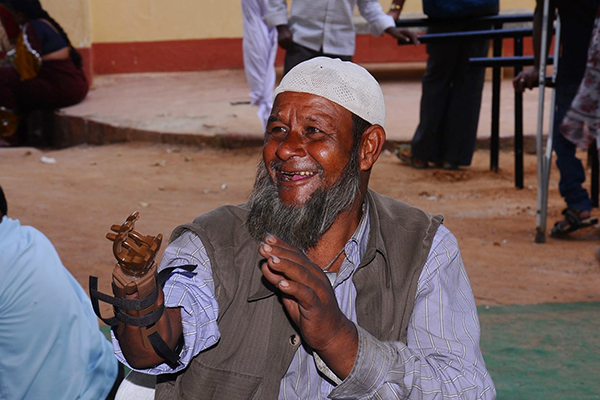
By Mohan Kumar K V, member of the Rotary Club of Bangalore Prime, India
Guided by Rotary’s Action Plan, we embarked on a journey of service and empowerment, reaching the unreached by providing free below-the-elbow prosthetic hands to those who had lost limbs.
Our Give Hope Give Hand project restores mobility and dignity to individuals with limb differences, enabling them to live more fulfilling lives. Many of our recipients lost their hands as a result of being electrocuted, having road or industrial accidents, or mishandling fireworks.
Many receive prosthetic hands during one-day events organized in partnership with local Rotary clubs holding medical camps.
Leveraging Rotary’s extensive network, we find our beneficiaries through social media, WhatsApp, print media articles, radio broadcasts, and podcasts. We also collaborate with relevant government agencies, Lions clubs, governments, and corporations. These outreach efforts benefit the recipients and enhance Rotary’s public image.
We have had to develop innovative ideas to reach out to more people. Typically, an individual must have a residual stump length of at least four inches below the elbow to be fitted for a prosthetic hand. However, around 20-30% of our patients come in with stumps that are shorter than that. To address this issue, we collaborated with experts in the field and developed an extender that can be used to increase the length of the stump.
The impacts of a prosthetic hand are immediate and profound. One boy could use his prosthetic hand to write his 10th-grade exams, achieving a commendable score of 73%. Another youth could ride a bicycle to school and complete 12th grade. Other recipients have been able to resume previous vocations, earning income to support themselves and their families. We have received heartwarming videos that show recipients using their new hands to perform everyday activities such as drinking tea, combing their children’s hair, feeding their children, brushing their teeth, and even driving auto-rickshaws.
The power of Rotary to expand our reach and increase our impact was on display as our project continued to grow and expand. After launching in 2007 in India, we extended the project to encompass Sri Lanka, Bangladesh, Nepal, Zambia, and Mauritius, bringing joy to more than 30,000 individuals. This achievement was made possible through collaborative efforts within Rotary’s network. I was privileged to address various Rotary gatherings across India to raise awareness and build capacity.
In Chandigarh, India, we worked with a farmer’s union to find farmers who had lost hands in accidents with agricultural machinery. We provided 1,279 prosthetic hands during a three-day camp. Then, when travel was limited during COVID, we conducted virtual training sessions for the Rotary Club of Flacq, Mauritius. The sessions enabled members to identify beneficiaries and distribute prosthetic hands, and the club has since expanded its outreach to neighboring islands. Additionally, with the assistance of the Ministry of Health in Zambia, I led a team to Lusaka in 2019 to facilitate the distribution of prosthetics. During a recent visit to Sri Lanka, I met a local Rotarian who connected us with a local nonprofit that provided prosthetic hands to war veterans who had lost limbs.
To ensure long-term sustainability, we also empowered local communities to take ownership of the effort by setting up experience centers in more than 30 locations across India. At any point, someone who has lost a hand can walk into one of these centers and get a prosthetic (or a replacement if needed). Some of the centers are at members’ homes or offices. By providing training and resources, we can equip community members with the skills and knowledge they need to support and advocate for individuals with disabilities.
Training is an essential component. Recipients need to learn how to operate their prosthetic hands to receive the maximum benefit. They regain independence and autonomy in their daily routines by learning proper techniques and strategies.
Adjusting to life with a prosthetic hand can be challenging – both emotionally and psychologically. Counseling provides recipients a safe space to express their feelings, fears, and frustrations about their limb loss and the adaptation process. By offering coping strategies, emotional support, and validation, counselors help recipients navigate their journeys’ emotional ups and downs. We have one volunteer, a previous recipient, who has coached and trained other recipients for the past 10 years.
As we follow the Action Plan to reach the unreached, we gain the power to transform lives. We’re building a more just, equitable, and compassionate world through the Magic of Rotary.
https://blog.rotary.org/2024/03/26/prosthetic-hands-change-lives/
